University of London: ENT301 Entrepreneurship Report
VerifiedAdded on 2020/10/23
|17
|4767
|99
Report
AI Summary
This report provides a comprehensive analysis of entrepreneurship and small business management. It begins by defining entrepreneurship and exploring different types of entrepreneurial ventures, including serial, social, and female entrepreneurs, along with various venture typologies such as small business, scalable start-ups, and large-scale entrepreneurship. The report then delves into the similarities and differences between these ventures, highlighting their varying objectives and operational approaches. A significant portion of the report assesses the impact of small and micro businesses on the UK economy, providing statistical data and detailing their contributions to employment generation, infrastructure development, and local, regional, and national economic growth. It also examines the impact of Brexit on the social economy. Furthermore, the report discusses the characteristics, traits, and skills of successful entrepreneurs, differentiating them from managers, and explores how entrepreneurial personality reflects motivation and mindset. Finally, it investigates how background and experience can either hinder or foster entrepreneurship. The report concludes by summarizing the key findings and implications of the analysis.

Entrepreneurship and Small
Business Management
Business Management
Paraphrase This Document
Need a fresh take? Get an instant paraphrase of this document with our AI Paraphraser
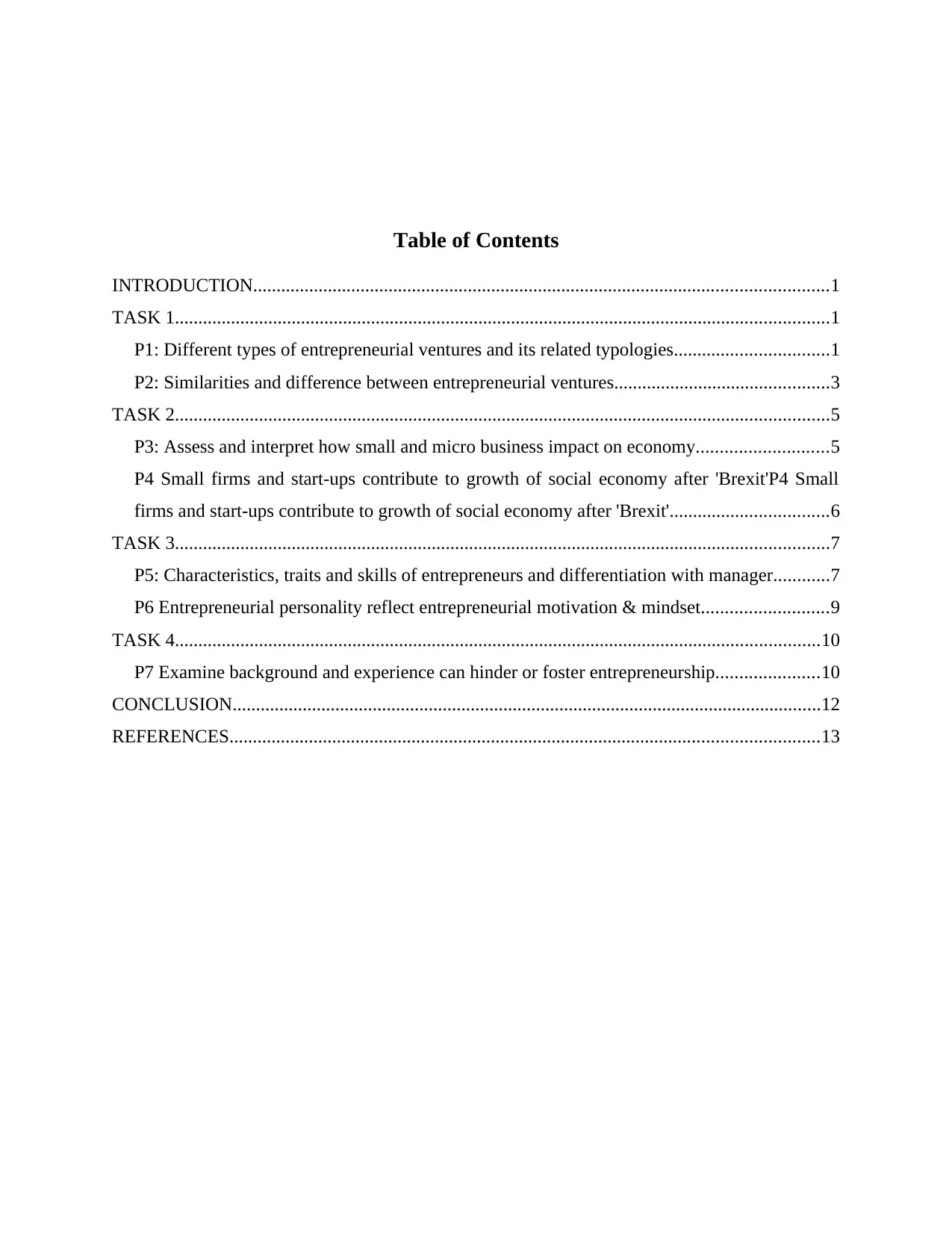
Table of Contents
INTRODUCTION...........................................................................................................................1
TASK 1............................................................................................................................................1
P1: Different types of entrepreneurial ventures and its related typologies.................................1
P2: Similarities and difference between entrepreneurial ventures..............................................3
TASK 2............................................................................................................................................5
P3: Assess and interpret how small and micro business impact on economy............................5
P4 Small firms and start-ups contribute to growth of social economy after 'Brexit'P4 Small
firms and start-ups contribute to growth of social economy after 'Brexit'..................................6
TASK 3............................................................................................................................................7
P5: Characteristics, traits and skills of entrepreneurs and differentiation with manager............7
P6 Entrepreneurial personality reflect entrepreneurial motivation & mindset...........................9
TASK 4..........................................................................................................................................10
P7 Examine background and experience can hinder or foster entrepreneurship......................10
CONCLUSION..............................................................................................................................12
REFERENCES..............................................................................................................................13
INTRODUCTION...........................................................................................................................1
TASK 1............................................................................................................................................1
P1: Different types of entrepreneurial ventures and its related typologies.................................1
P2: Similarities and difference between entrepreneurial ventures..............................................3
TASK 2............................................................................................................................................5
P3: Assess and interpret how small and micro business impact on economy............................5
P4 Small firms and start-ups contribute to growth of social economy after 'Brexit'P4 Small
firms and start-ups contribute to growth of social economy after 'Brexit'..................................6
TASK 3............................................................................................................................................7
P5: Characteristics, traits and skills of entrepreneurs and differentiation with manager............7
P6 Entrepreneurial personality reflect entrepreneurial motivation & mindset...........................9
TASK 4..........................................................................................................................................10
P7 Examine background and experience can hinder or foster entrepreneurship......................10
CONCLUSION..............................................................................................................................12
REFERENCES..............................................................................................................................13

⊘ This is a preview!⊘
Do you want full access?
Subscribe today to unlock all pages.

Trusted by 1+ million students worldwide
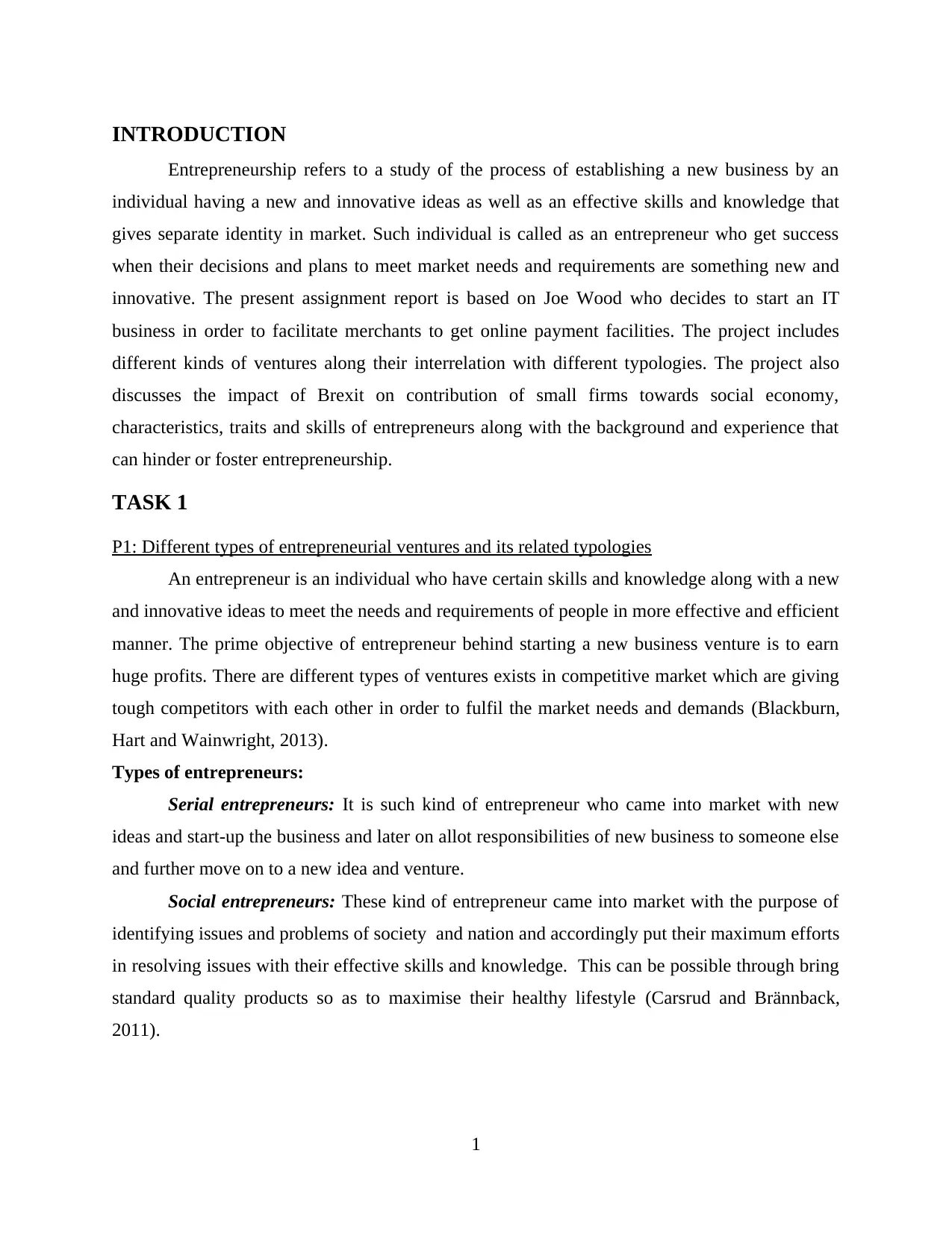
INTRODUCTION
Entrepreneurship refers to a study of the process of establishing a new business by an
individual having a new and innovative ideas as well as an effective skills and knowledge that
gives separate identity in market. Such individual is called as an entrepreneur who get success
when their decisions and plans to meet market needs and requirements are something new and
innovative. The present assignment report is based on Joe Wood who decides to start an IT
business in order to facilitate merchants to get online payment facilities. The project includes
different kinds of ventures along their interrelation with different typologies. The project also
discusses the impact of Brexit on contribution of small firms towards social economy,
characteristics, traits and skills of entrepreneurs along with the background and experience that
can hinder or foster entrepreneurship.
TASK 1
P1: Different types of entrepreneurial ventures and its related typologies
An entrepreneur is an individual who have certain skills and knowledge along with a new
and innovative ideas to meet the needs and requirements of people in more effective and efficient
manner. The prime objective of entrepreneur behind starting a new business venture is to earn
huge profits. There are different types of ventures exists in competitive market which are giving
tough competitors with each other in order to fulfil the market needs and demands (Blackburn,
Hart and Wainwright, 2013).
Types of entrepreneurs:
Serial entrepreneurs: It is such kind of entrepreneur who came into market with new
ideas and start-up the business and later on allot responsibilities of new business to someone else
and further move on to a new idea and venture.
Social entrepreneurs: These kind of entrepreneur came into market with the purpose of
identifying issues and problems of society and nation and accordingly put their maximum efforts
in resolving issues with their effective skills and knowledge. This can be possible through bring
standard quality products so as to maximise their healthy lifestyle (Carsrud and Brännback,
2011).
1
Entrepreneurship refers to a study of the process of establishing a new business by an
individual having a new and innovative ideas as well as an effective skills and knowledge that
gives separate identity in market. Such individual is called as an entrepreneur who get success
when their decisions and plans to meet market needs and requirements are something new and
innovative. The present assignment report is based on Joe Wood who decides to start an IT
business in order to facilitate merchants to get online payment facilities. The project includes
different kinds of ventures along their interrelation with different typologies. The project also
discusses the impact of Brexit on contribution of small firms towards social economy,
characteristics, traits and skills of entrepreneurs along with the background and experience that
can hinder or foster entrepreneurship.
TASK 1
P1: Different types of entrepreneurial ventures and its related typologies
An entrepreneur is an individual who have certain skills and knowledge along with a new
and innovative ideas to meet the needs and requirements of people in more effective and efficient
manner. The prime objective of entrepreneur behind starting a new business venture is to earn
huge profits. There are different types of ventures exists in competitive market which are giving
tough competitors with each other in order to fulfil the market needs and demands (Blackburn,
Hart and Wainwright, 2013).
Types of entrepreneurs:
Serial entrepreneurs: It is such kind of entrepreneur who came into market with new
ideas and start-up the business and later on allot responsibilities of new business to someone else
and further move on to a new idea and venture.
Social entrepreneurs: These kind of entrepreneur came into market with the purpose of
identifying issues and problems of society and nation and accordingly put their maximum efforts
in resolving issues with their effective skills and knowledge. This can be possible through bring
standard quality products so as to maximise their healthy lifestyle (Carsrud and Brännback,
2011).
1
Paraphrase This Document
Need a fresh take? Get an instant paraphrase of this document with our AI Paraphraser
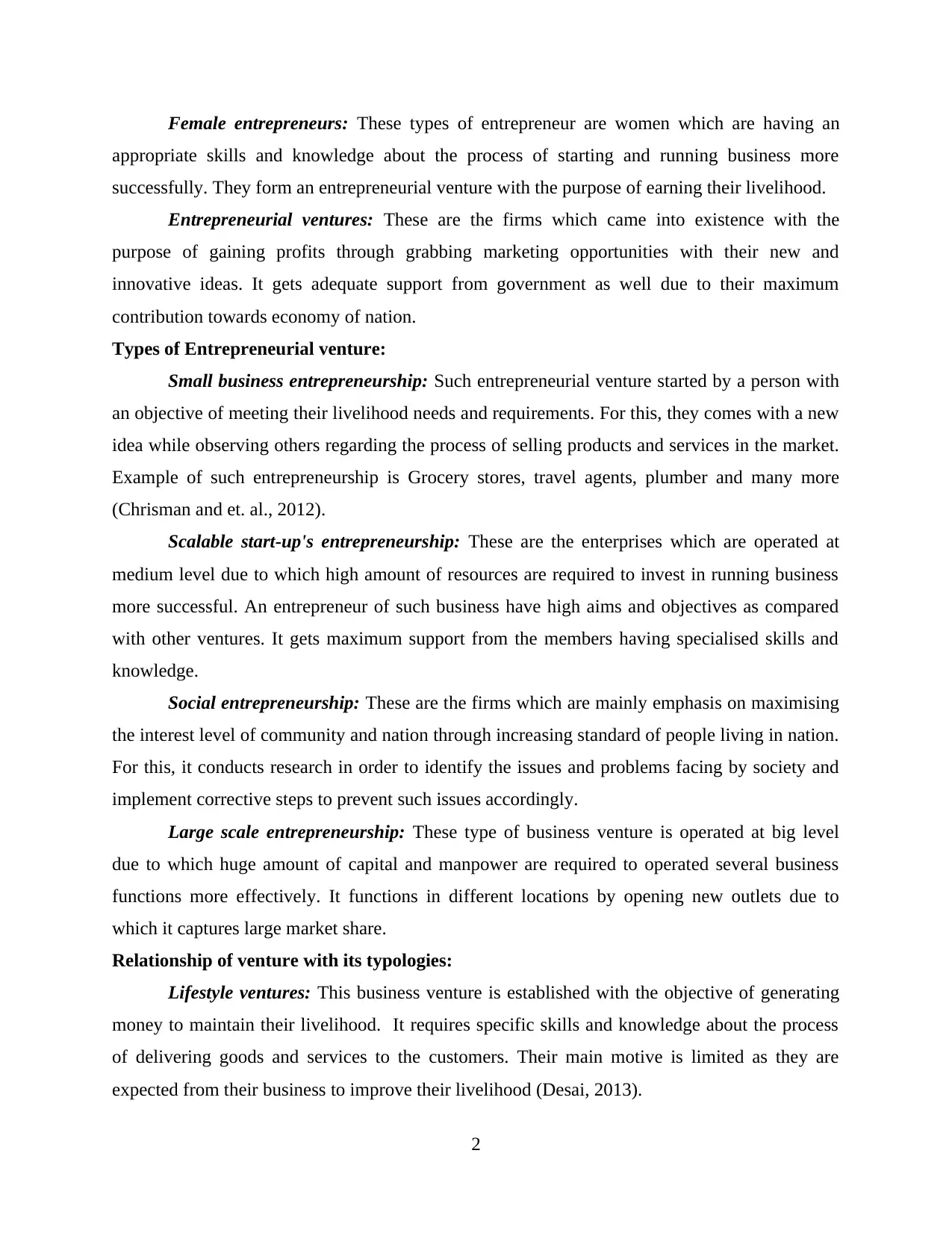
Female entrepreneurs: These types of entrepreneur are women which are having an
appropriate skills and knowledge about the process of starting and running business more
successfully. They form an entrepreneurial venture with the purpose of earning their livelihood.
Entrepreneurial ventures: These are the firms which came into existence with the
purpose of gaining profits through grabbing marketing opportunities with their new and
innovative ideas. It gets adequate support from government as well due to their maximum
contribution towards economy of nation.
Types of Entrepreneurial venture:
Small business entrepreneurship: Such entrepreneurial venture started by a person with
an objective of meeting their livelihood needs and requirements. For this, they comes with a new
idea while observing others regarding the process of selling products and services in the market.
Example of such entrepreneurship is Grocery stores, travel agents, plumber and many more
(Chrisman and et. al., 2012).
Scalable start-up's entrepreneurship: These are the enterprises which are operated at
medium level due to which high amount of resources are required to invest in running business
more successful. An entrepreneur of such business have high aims and objectives as compared
with other ventures. It gets maximum support from the members having specialised skills and
knowledge.
Social entrepreneurship: These are the firms which are mainly emphasis on maximising
the interest level of community and nation through increasing standard of people living in nation.
For this, it conducts research in order to identify the issues and problems facing by society and
implement corrective steps to prevent such issues accordingly.
Large scale entrepreneurship: These type of business venture is operated at big level
due to which huge amount of capital and manpower are required to operated several business
functions more effectively. It functions in different locations by opening new outlets due to
which it captures large market share.
Relationship of venture with its typologies:
Lifestyle ventures: This business venture is established with the objective of generating
money to maintain their livelihood. It requires specific skills and knowledge about the process
of delivering goods and services to the customers. Their main motive is limited as they are
expected from their business to improve their livelihood (Desai, 2013).
2
appropriate skills and knowledge about the process of starting and running business more
successfully. They form an entrepreneurial venture with the purpose of earning their livelihood.
Entrepreneurial ventures: These are the firms which came into existence with the
purpose of gaining profits through grabbing marketing opportunities with their new and
innovative ideas. It gets adequate support from government as well due to their maximum
contribution towards economy of nation.
Types of Entrepreneurial venture:
Small business entrepreneurship: Such entrepreneurial venture started by a person with
an objective of meeting their livelihood needs and requirements. For this, they comes with a new
idea while observing others regarding the process of selling products and services in the market.
Example of such entrepreneurship is Grocery stores, travel agents, plumber and many more
(Chrisman and et. al., 2012).
Scalable start-up's entrepreneurship: These are the enterprises which are operated at
medium level due to which high amount of resources are required to invest in running business
more successful. An entrepreneur of such business have high aims and objectives as compared
with other ventures. It gets maximum support from the members having specialised skills and
knowledge.
Social entrepreneurship: These are the firms which are mainly emphasis on maximising
the interest level of community and nation through increasing standard of people living in nation.
For this, it conducts research in order to identify the issues and problems facing by society and
implement corrective steps to prevent such issues accordingly.
Large scale entrepreneurship: These type of business venture is operated at big level
due to which huge amount of capital and manpower are required to operated several business
functions more effectively. It functions in different locations by opening new outlets due to
which it captures large market share.
Relationship of venture with its typologies:
Lifestyle ventures: This business venture is established with the objective of generating
money to maintain their livelihood. It requires specific skills and knowledge about the process
of delivering goods and services to the customers. Their main motive is limited as they are
expected from their business to improve their livelihood (Desai, 2013).
2
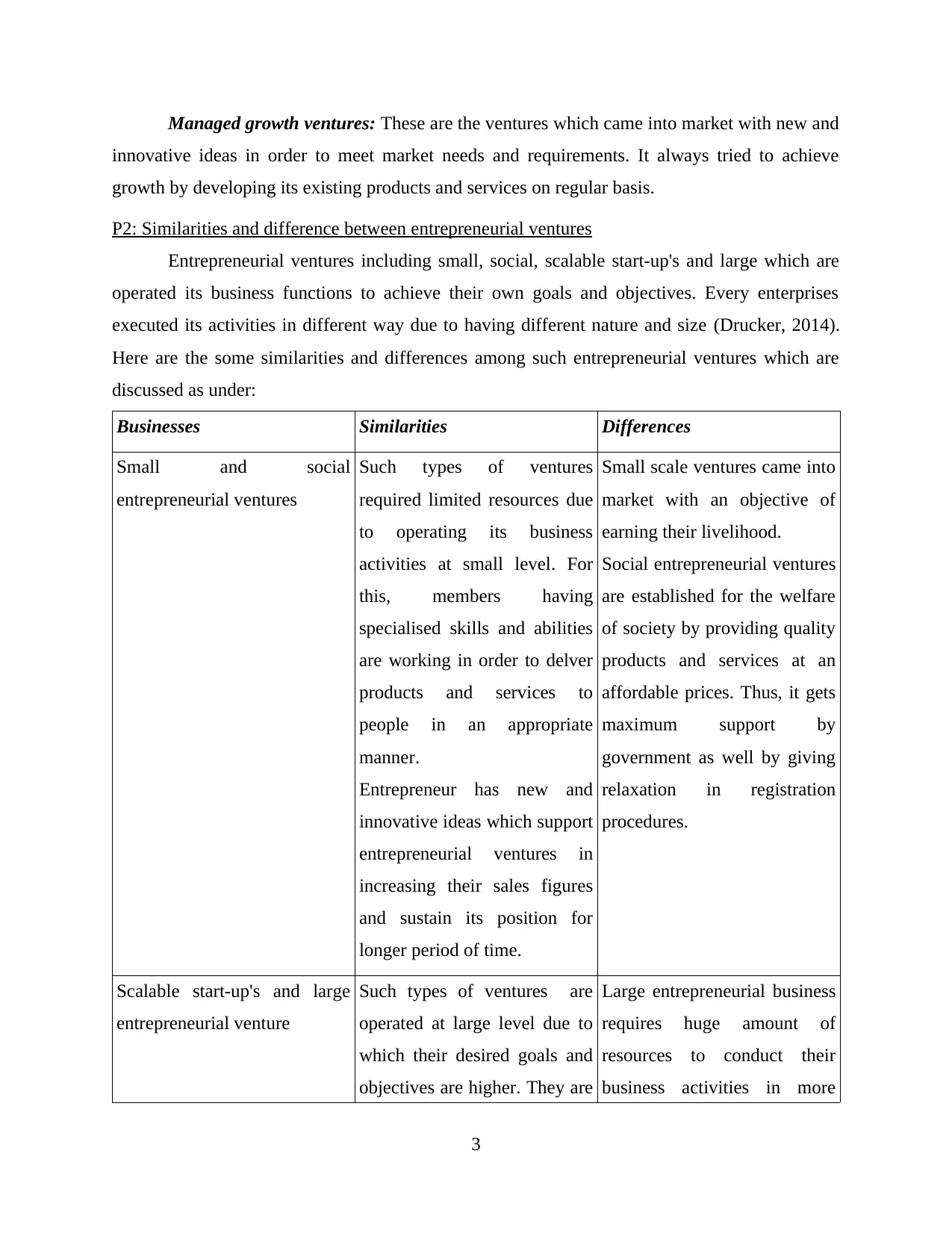
Managed growth ventures: These are the ventures which came into market with new and
innovative ideas in order to meet market needs and requirements. It always tried to achieve
growth by developing its existing products and services on regular basis.
P2: Similarities and difference between entrepreneurial ventures
Entrepreneurial ventures including small, social, scalable start-up's and large which are
operated its business functions to achieve their own goals and objectives. Every enterprises
executed its activities in different way due to having different nature and size (Drucker, 2014).
Here are the some similarities and differences among such entrepreneurial ventures which are
discussed as under:
Businesses Similarities Differences
Small and social
entrepreneurial ventures
Such types of ventures
required limited resources due
to operating its business
activities at small level. For
this, members having
specialised skills and abilities
are working in order to delver
products and services to
people in an appropriate
manner.
Entrepreneur has new and
innovative ideas which support
entrepreneurial ventures in
increasing their sales figures
and sustain its position for
longer period of time.
Small scale ventures came into
market with an objective of
earning their livelihood.
Social entrepreneurial ventures
are established for the welfare
of society by providing quality
products and services at an
affordable prices. Thus, it gets
maximum support by
government as well by giving
relaxation in registration
procedures.
Scalable start-up's and large
entrepreneurial venture
Such types of ventures are
operated at large level due to
which their desired goals and
objectives are higher. They are
Large entrepreneurial business
requires huge amount of
resources to conduct their
business activities in more
3
innovative ideas in order to meet market needs and requirements. It always tried to achieve
growth by developing its existing products and services on regular basis.
P2: Similarities and difference between entrepreneurial ventures
Entrepreneurial ventures including small, social, scalable start-up's and large which are
operated its business functions to achieve their own goals and objectives. Every enterprises
executed its activities in different way due to having different nature and size (Drucker, 2014).
Here are the some similarities and differences among such entrepreneurial ventures which are
discussed as under:
Businesses Similarities Differences
Small and social
entrepreneurial ventures
Such types of ventures
required limited resources due
to operating its business
activities at small level. For
this, members having
specialised skills and abilities
are working in order to delver
products and services to
people in an appropriate
manner.
Entrepreneur has new and
innovative ideas which support
entrepreneurial ventures in
increasing their sales figures
and sustain its position for
longer period of time.
Small scale ventures came into
market with an objective of
earning their livelihood.
Social entrepreneurial ventures
are established for the welfare
of society by providing quality
products and services at an
affordable prices. Thus, it gets
maximum support by
government as well by giving
relaxation in registration
procedures.
Scalable start-up's and large
entrepreneurial venture
Such types of ventures are
operated at large level due to
which their desired goals and
objectives are higher. They are
Large entrepreneurial business
requires huge amount of
resources to conduct their
business activities in more
3
⊘ This is a preview!⊘
Do you want full access?
Subscribe today to unlock all pages.

Trusted by 1+ million students worldwide
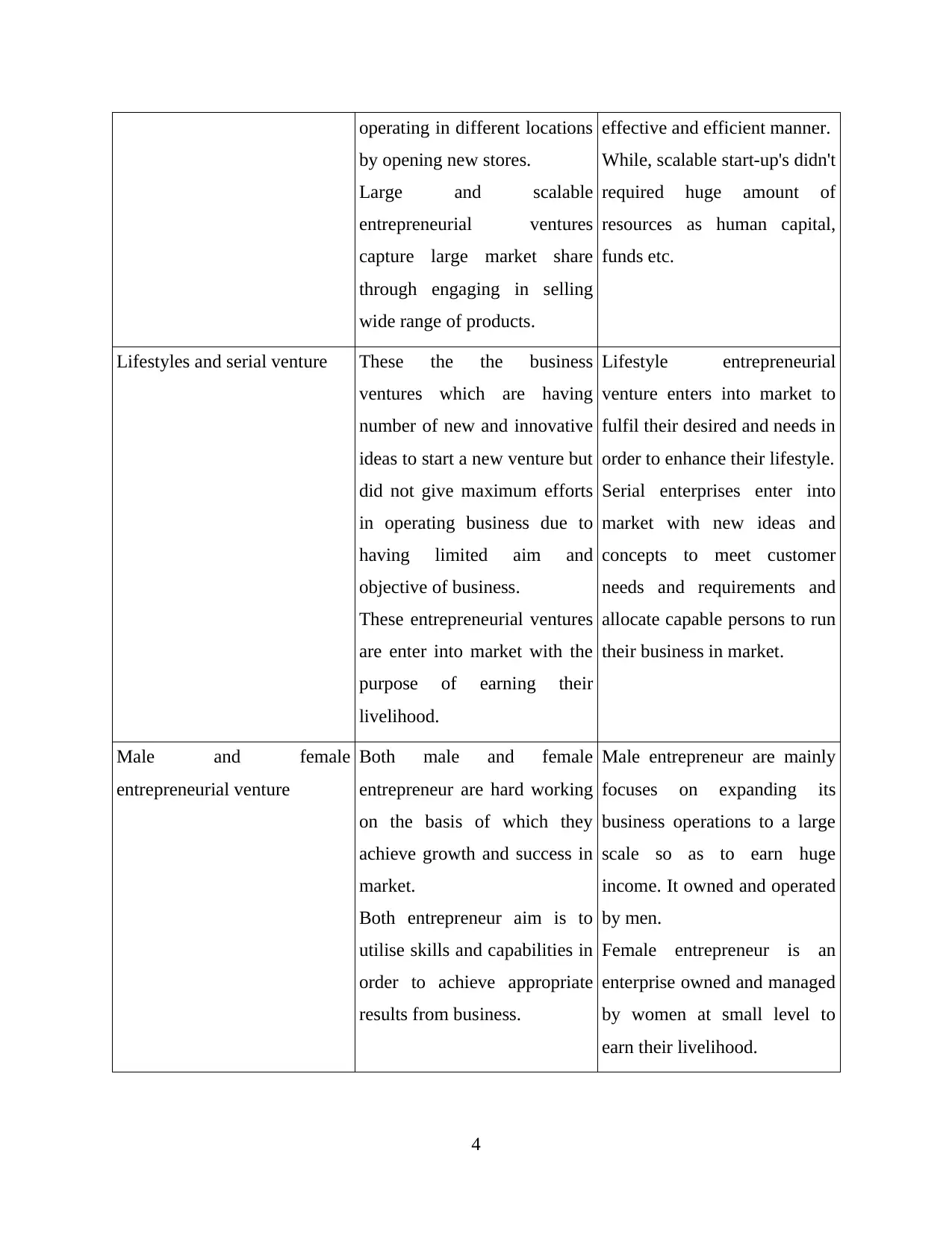
operating in different locations
by opening new stores.
Large and scalable
entrepreneurial ventures
capture large market share
through engaging in selling
wide range of products.
effective and efficient manner.
While, scalable start-up's didn't
required huge amount of
resources as human capital,
funds etc.
Lifestyles and serial venture These the the business
ventures which are having
number of new and innovative
ideas to start a new venture but
did not give maximum efforts
in operating business due to
having limited aim and
objective of business.
These entrepreneurial ventures
are enter into market with the
purpose of earning their
livelihood.
Lifestyle entrepreneurial
venture enters into market to
fulfil their desired and needs in
order to enhance their lifestyle.
Serial enterprises enter into
market with new ideas and
concepts to meet customer
needs and requirements and
allocate capable persons to run
their business in market.
Male and female
entrepreneurial venture
Both male and female
entrepreneur are hard working
on the basis of which they
achieve growth and success in
market.
Both entrepreneur aim is to
utilise skills and capabilities in
order to achieve appropriate
results from business.
Male entrepreneur are mainly
focuses on expanding its
business operations to a large
scale so as to earn huge
income. It owned and operated
by men.
Female entrepreneur is an
enterprise owned and managed
by women at small level to
earn their livelihood.
4
by opening new stores.
Large and scalable
entrepreneurial ventures
capture large market share
through engaging in selling
wide range of products.
effective and efficient manner.
While, scalable start-up's didn't
required huge amount of
resources as human capital,
funds etc.
Lifestyles and serial venture These the the business
ventures which are having
number of new and innovative
ideas to start a new venture but
did not give maximum efforts
in operating business due to
having limited aim and
objective of business.
These entrepreneurial ventures
are enter into market with the
purpose of earning their
livelihood.
Lifestyle entrepreneurial
venture enters into market to
fulfil their desired and needs in
order to enhance their lifestyle.
Serial enterprises enter into
market with new ideas and
concepts to meet customer
needs and requirements and
allocate capable persons to run
their business in market.
Male and female
entrepreneurial venture
Both male and female
entrepreneur are hard working
on the basis of which they
achieve growth and success in
market.
Both entrepreneur aim is to
utilise skills and capabilities in
order to achieve appropriate
results from business.
Male entrepreneur are mainly
focuses on expanding its
business operations to a large
scale so as to earn huge
income. It owned and operated
by men.
Female entrepreneur is an
enterprise owned and managed
by women at small level to
earn their livelihood.
4
Paraphrase This Document
Need a fresh take? Get an instant paraphrase of this document with our AI Paraphraser
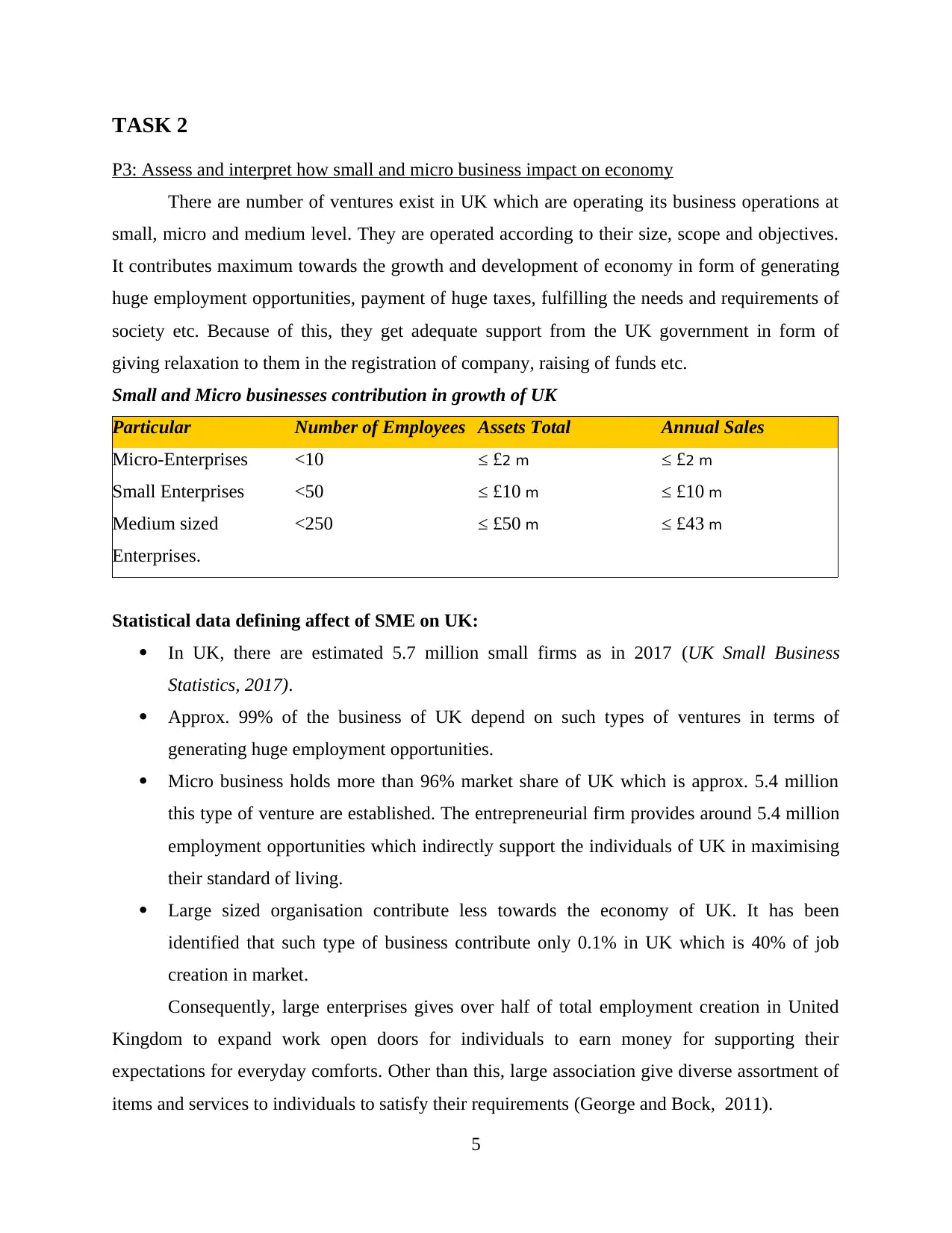
TASK 2
P3: Assess and interpret how small and micro business impact on economy
There are number of ventures exist in UK which are operating its business operations at
small, micro and medium level. They are operated according to their size, scope and objectives.
It contributes maximum towards the growth and development of economy in form of generating
huge employment opportunities, payment of huge taxes, fulfilling the needs and requirements of
society etc. Because of this, they get adequate support from the UK government in form of
giving relaxation to them in the registration of company, raising of funds etc.
Small and Micro businesses contribution in growth of UK
Particular Number of Employees Assets Total Annual Sales
Micro-Enterprises <10 ≤ £2 m ≤ £2 m
Small Enterprises <50 ≤ £10 m ≤ £10 m
Medium sized
Enterprises.
<250 ≤ £50 m ≤ £43 m
Statistical data defining affect of SME on UK:
In UK, there are estimated 5.7 million small firms as in 2017 (UK Small Business
Statistics, 2017).
Approx. 99% of the business of UK depend on such types of ventures in terms of
generating huge employment opportunities.
Micro business holds more than 96% market share of UK which is approx. 5.4 million
this type of venture are established. The entrepreneurial firm provides around 5.4 million
employment opportunities which indirectly support the individuals of UK in maximising
their standard of living.
Large sized organisation contribute less towards the economy of UK. It has been
identified that such type of business contribute only 0.1% in UK which is 40% of job
creation in market.
Consequently, large enterprises gives over half of total employment creation in United
Kingdom to expand work open doors for individuals to earn money for supporting their
expectations for everyday comforts. Other than this, large association give diverse assortment of
items and services to individuals to satisfy their requirements (George and Bock, 2011).
5
P3: Assess and interpret how small and micro business impact on economy
There are number of ventures exist in UK which are operating its business operations at
small, micro and medium level. They are operated according to their size, scope and objectives.
It contributes maximum towards the growth and development of economy in form of generating
huge employment opportunities, payment of huge taxes, fulfilling the needs and requirements of
society etc. Because of this, they get adequate support from the UK government in form of
giving relaxation to them in the registration of company, raising of funds etc.
Small and Micro businesses contribution in growth of UK
Particular Number of Employees Assets Total Annual Sales
Micro-Enterprises <10 ≤ £2 m ≤ £2 m
Small Enterprises <50 ≤ £10 m ≤ £10 m
Medium sized
Enterprises.
<250 ≤ £50 m ≤ £43 m
Statistical data defining affect of SME on UK:
In UK, there are estimated 5.7 million small firms as in 2017 (UK Small Business
Statistics, 2017).
Approx. 99% of the business of UK depend on such types of ventures in terms of
generating huge employment opportunities.
Micro business holds more than 96% market share of UK which is approx. 5.4 million
this type of venture are established. The entrepreneurial firm provides around 5.4 million
employment opportunities which indirectly support the individuals of UK in maximising
their standard of living.
Large sized organisation contribute less towards the economy of UK. It has been
identified that such type of business contribute only 0.1% in UK which is 40% of job
creation in market.
Consequently, large enterprises gives over half of total employment creation in United
Kingdom to expand work open doors for individuals to earn money for supporting their
expectations for everyday comforts. Other than this, large association give diverse assortment of
items and services to individuals to satisfy their requirements (George and Bock, 2011).
5
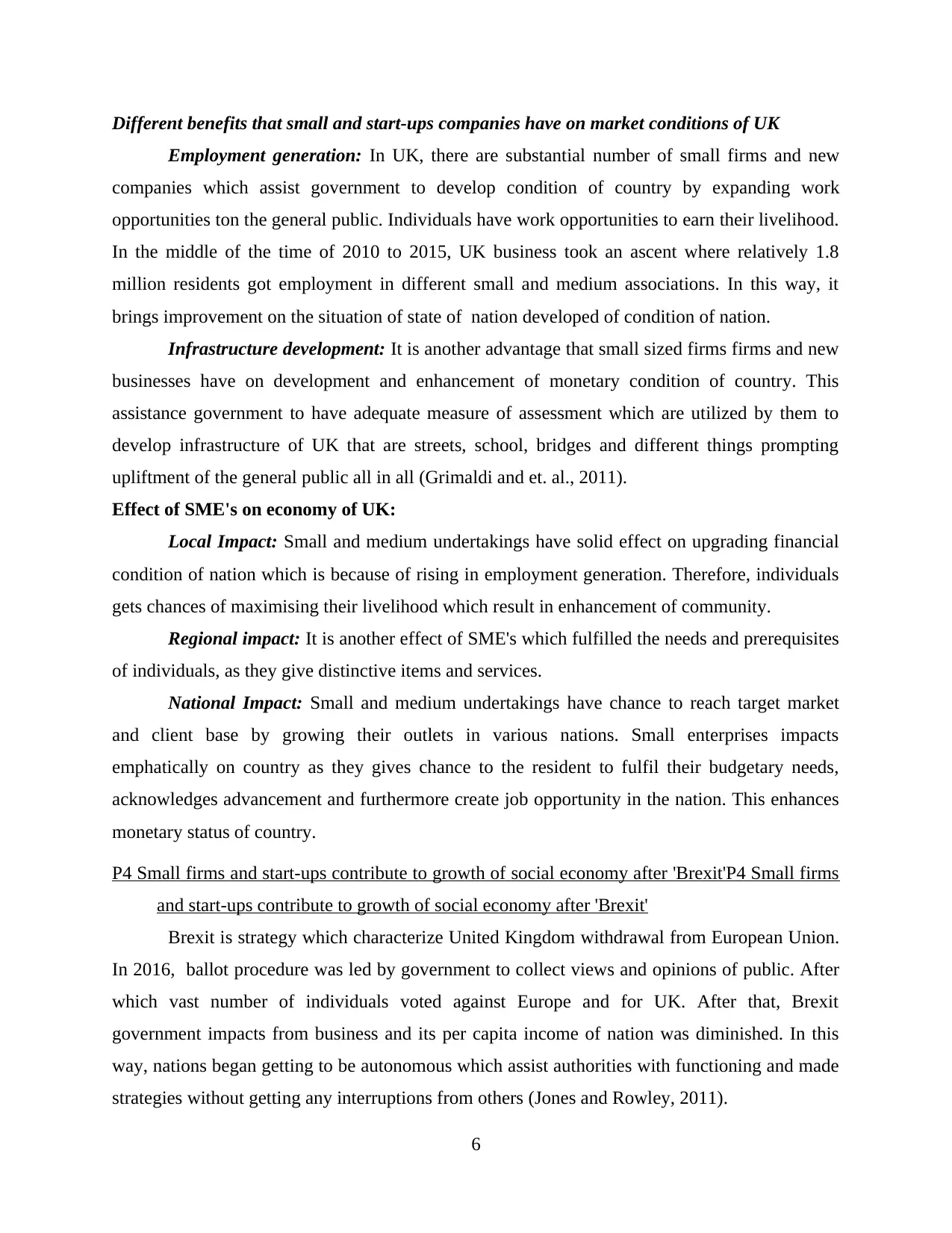
Different benefits that small and start-ups companies have on market conditions of UK
Employment generation: In UK, there are substantial number of small firms and new
companies which assist government to develop condition of country by expanding work
opportunities ton the general public. Individuals have work opportunities to earn their livelihood.
In the middle of the time of 2010 to 2015, UK business took an ascent where relatively 1.8
million residents got employment in different small and medium associations. In this way, it
brings improvement on the situation of state of nation developed of condition of nation.
Infrastructure development: It is another advantage that small sized firms firms and new
businesses have on development and enhancement of monetary condition of country. This
assistance government to have adequate measure of assessment which are utilized by them to
develop infrastructure of UK that are streets, school, bridges and different things prompting
upliftment of the general public all in all (Grimaldi and et. al., 2011).
Effect of SME's on economy of UK:
Local Impact: Small and medium undertakings have solid effect on upgrading financial
condition of nation which is because of rising in employment generation. Therefore, individuals
gets chances of maximising their livelihood which result in enhancement of community.
Regional impact: It is another effect of SME's which fulfilled the needs and prerequisites
of individuals, as they give distinctive items and services.
National Impact: Small and medium undertakings have chance to reach target market
and client base by growing their outlets in various nations. Small enterprises impacts
emphatically on country as they gives chance to the resident to fulfil their budgetary needs,
acknowledges advancement and furthermore create job opportunity in the nation. This enhances
monetary status of country.
P4 Small firms and start-ups contribute to growth of social economy after 'Brexit'P4 Small firms
and start-ups contribute to growth of social economy after 'Brexit'
Brexit is strategy which characterize United Kingdom withdrawal from European Union.
In 2016, ballot procedure was led by government to collect views and opinions of public. After
which vast number of individuals voted against Europe and for UK. After that, Brexit
government impacts from business and its per capita income of nation was diminished. In this
way, nations began getting to be autonomous which assist authorities with functioning and made
strategies without getting any interruptions from others (Jones and Rowley, 2011).
6
Employment generation: In UK, there are substantial number of small firms and new
companies which assist government to develop condition of country by expanding work
opportunities ton the general public. Individuals have work opportunities to earn their livelihood.
In the middle of the time of 2010 to 2015, UK business took an ascent where relatively 1.8
million residents got employment in different small and medium associations. In this way, it
brings improvement on the situation of state of nation developed of condition of nation.
Infrastructure development: It is another advantage that small sized firms firms and new
businesses have on development and enhancement of monetary condition of country. This
assistance government to have adequate measure of assessment which are utilized by them to
develop infrastructure of UK that are streets, school, bridges and different things prompting
upliftment of the general public all in all (Grimaldi and et. al., 2011).
Effect of SME's on economy of UK:
Local Impact: Small and medium undertakings have solid effect on upgrading financial
condition of nation which is because of rising in employment generation. Therefore, individuals
gets chances of maximising their livelihood which result in enhancement of community.
Regional impact: It is another effect of SME's which fulfilled the needs and prerequisites
of individuals, as they give distinctive items and services.
National Impact: Small and medium undertakings have chance to reach target market
and client base by growing their outlets in various nations. Small enterprises impacts
emphatically on country as they gives chance to the resident to fulfil their budgetary needs,
acknowledges advancement and furthermore create job opportunity in the nation. This enhances
monetary status of country.
P4 Small firms and start-ups contribute to growth of social economy after 'Brexit'P4 Small firms
and start-ups contribute to growth of social economy after 'Brexit'
Brexit is strategy which characterize United Kingdom withdrawal from European Union.
In 2016, ballot procedure was led by government to collect views and opinions of public. After
which vast number of individuals voted against Europe and for UK. After that, Brexit
government impacts from business and its per capita income of nation was diminished. In this
way, nations began getting to be autonomous which assist authorities with functioning and made
strategies without getting any interruptions from others (Jones and Rowley, 2011).
6
⊘ This is a preview!⊘
Do you want full access?
Subscribe today to unlock all pages.

Trusted by 1+ million students worldwide
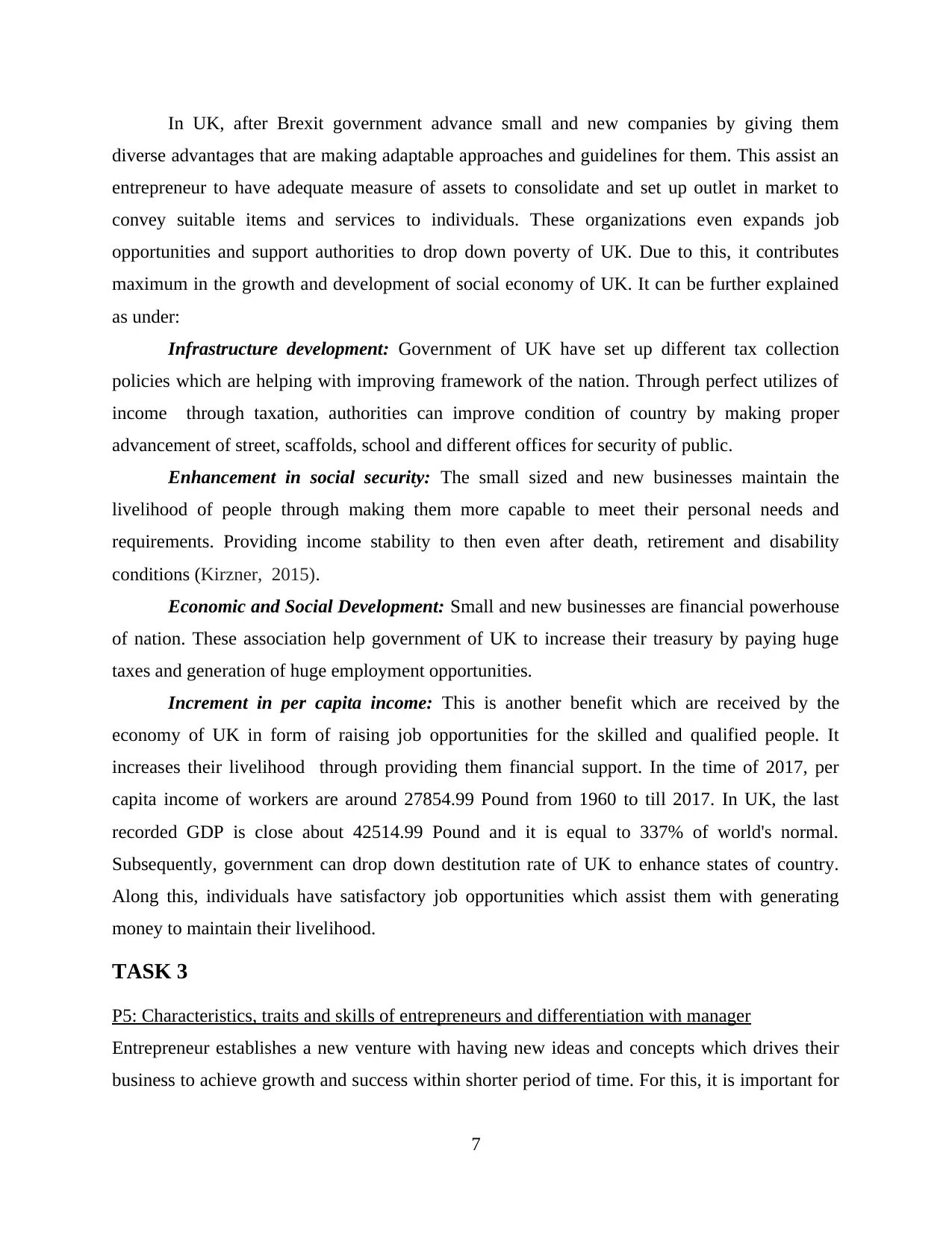
In UK, after Brexit government advance small and new companies by giving them
diverse advantages that are making adaptable approaches and guidelines for them. This assist an
entrepreneur to have adequate measure of assets to consolidate and set up outlet in market to
convey suitable items and services to individuals. These organizations even expands job
opportunities and support authorities to drop down poverty of UK. Due to this, it contributes
maximum in the growth and development of social economy of UK. It can be further explained
as under:
Infrastructure development: Government of UK have set up different tax collection
policies which are helping with improving framework of the nation. Through perfect utilizes of
income through taxation, authorities can improve condition of country by making proper
advancement of street, scaffolds, school and different offices for security of public.
Enhancement in social security: The small sized and new businesses maintain the
livelihood of people through making them more capable to meet their personal needs and
requirements. Providing income stability to then even after death, retirement and disability
conditions (Kirzner, 2015).
Economic and Social Development: Small and new businesses are financial powerhouse
of nation. These association help government of UK to increase their treasury by paying huge
taxes and generation of huge employment opportunities.
Increment in per capita income: This is another benefit which are received by the
economy of UK in form of raising job opportunities for the skilled and qualified people. It
increases their livelihood through providing them financial support. In the time of 2017, per
capita income of workers are around 27854.99 Pound from 1960 to till 2017. In UK, the last
recorded GDP is close about 42514.99 Pound and it is equal to 337% of world's normal.
Subsequently, government can drop down destitution rate of UK to enhance states of country.
Along this, individuals have satisfactory job opportunities which assist them with generating
money to maintain their livelihood.
TASK 3
P5: Characteristics, traits and skills of entrepreneurs and differentiation with manager
Entrepreneur establishes a new venture with having new ideas and concepts which drives their
business to achieve growth and success within shorter period of time. For this, it is important for
7
diverse advantages that are making adaptable approaches and guidelines for them. This assist an
entrepreneur to have adequate measure of assets to consolidate and set up outlet in market to
convey suitable items and services to individuals. These organizations even expands job
opportunities and support authorities to drop down poverty of UK. Due to this, it contributes
maximum in the growth and development of social economy of UK. It can be further explained
as under:
Infrastructure development: Government of UK have set up different tax collection
policies which are helping with improving framework of the nation. Through perfect utilizes of
income through taxation, authorities can improve condition of country by making proper
advancement of street, scaffolds, school and different offices for security of public.
Enhancement in social security: The small sized and new businesses maintain the
livelihood of people through making them more capable to meet their personal needs and
requirements. Providing income stability to then even after death, retirement and disability
conditions (Kirzner, 2015).
Economic and Social Development: Small and new businesses are financial powerhouse
of nation. These association help government of UK to increase their treasury by paying huge
taxes and generation of huge employment opportunities.
Increment in per capita income: This is another benefit which are received by the
economy of UK in form of raising job opportunities for the skilled and qualified people. It
increases their livelihood through providing them financial support. In the time of 2017, per
capita income of workers are around 27854.99 Pound from 1960 to till 2017. In UK, the last
recorded GDP is close about 42514.99 Pound and it is equal to 337% of world's normal.
Subsequently, government can drop down destitution rate of UK to enhance states of country.
Along this, individuals have satisfactory job opportunities which assist them with generating
money to maintain their livelihood.
TASK 3
P5: Characteristics, traits and skills of entrepreneurs and differentiation with manager
Entrepreneur establishes a new venture with having new ideas and concepts which drives their
business to achieve growth and success within shorter period of time. For this, it is important for
7
Paraphrase This Document
Need a fresh take? Get an instant paraphrase of this document with our AI Paraphraser
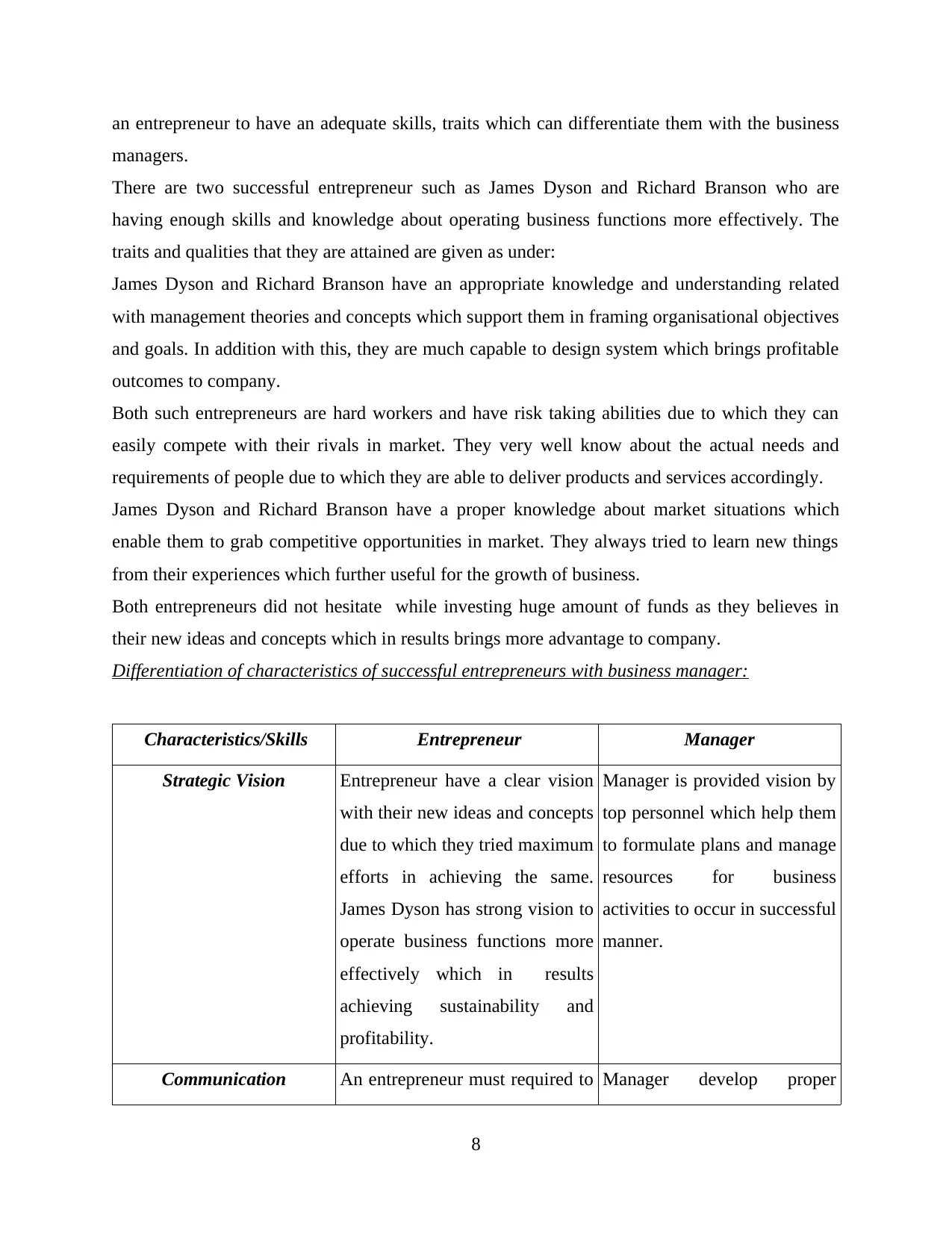
an entrepreneur to have an adequate skills, traits which can differentiate them with the business
managers.
There are two successful entrepreneur such as James Dyson and Richard Branson who are
having enough skills and knowledge about operating business functions more effectively. The
traits and qualities that they are attained are given as under:
James Dyson and Richard Branson have an appropriate knowledge and understanding related
with management theories and concepts which support them in framing organisational objectives
and goals. In addition with this, they are much capable to design system which brings profitable
outcomes to company.
Both such entrepreneurs are hard workers and have risk taking abilities due to which they can
easily compete with their rivals in market. They very well know about the actual needs and
requirements of people due to which they are able to deliver products and services accordingly.
James Dyson and Richard Branson have a proper knowledge about market situations which
enable them to grab competitive opportunities in market. They always tried to learn new things
from their experiences which further useful for the growth of business.
Both entrepreneurs did not hesitate while investing huge amount of funds as they believes in
their new ideas and concepts which in results brings more advantage to company.
Differentiation of characteristics of successful entrepreneurs with business manager:
Characteristics/Skills Entrepreneur Manager
Strategic Vision Entrepreneur have a clear vision
with their new ideas and concepts
due to which they tried maximum
efforts in achieving the same.
James Dyson has strong vision to
operate business functions more
effectively which in results
achieving sustainability and
profitability.
Manager is provided vision by
top personnel which help them
to formulate plans and manage
resources for business
activities to occur in successful
manner.
Communication An entrepreneur must required to Manager develop proper
8
managers.
There are two successful entrepreneur such as James Dyson and Richard Branson who are
having enough skills and knowledge about operating business functions more effectively. The
traits and qualities that they are attained are given as under:
James Dyson and Richard Branson have an appropriate knowledge and understanding related
with management theories and concepts which support them in framing organisational objectives
and goals. In addition with this, they are much capable to design system which brings profitable
outcomes to company.
Both such entrepreneurs are hard workers and have risk taking abilities due to which they can
easily compete with their rivals in market. They very well know about the actual needs and
requirements of people due to which they are able to deliver products and services accordingly.
James Dyson and Richard Branson have a proper knowledge about market situations which
enable them to grab competitive opportunities in market. They always tried to learn new things
from their experiences which further useful for the growth of business.
Both entrepreneurs did not hesitate while investing huge amount of funds as they believes in
their new ideas and concepts which in results brings more advantage to company.
Differentiation of characteristics of successful entrepreneurs with business manager:
Characteristics/Skills Entrepreneur Manager
Strategic Vision Entrepreneur have a clear vision
with their new ideas and concepts
due to which they tried maximum
efforts in achieving the same.
James Dyson has strong vision to
operate business functions more
effectively which in results
achieving sustainability and
profitability.
Manager is provided vision by
top personnel which help them
to formulate plans and manage
resources for business
activities to occur in successful
manner.
Communication An entrepreneur must required to Manager develop proper
8
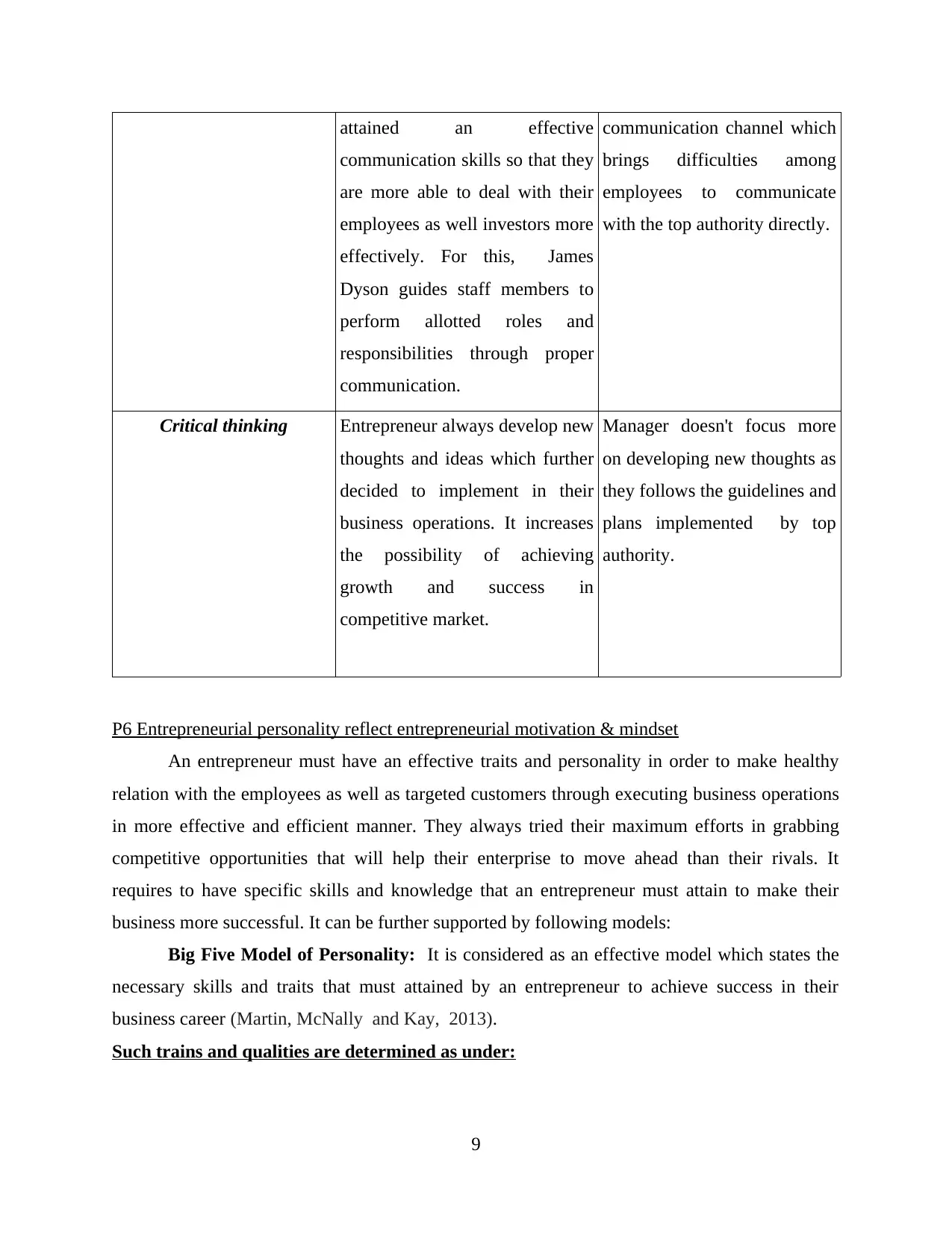
attained an effective
communication skills so that they
are more able to deal with their
employees as well investors more
effectively. For this, James
Dyson guides staff members to
perform allotted roles and
responsibilities through proper
communication.
communication channel which
brings difficulties among
employees to communicate
with the top authority directly.
Critical thinking Entrepreneur always develop new
thoughts and ideas which further
decided to implement in their
business operations. It increases
the possibility of achieving
growth and success in
competitive market.
Manager doesn't focus more
on developing new thoughts as
they follows the guidelines and
plans implemented by top
authority.
P6 Entrepreneurial personality reflect entrepreneurial motivation & mindset
An entrepreneur must have an effective traits and personality in order to make healthy
relation with the employees as well as targeted customers through executing business operations
in more effective and efficient manner. They always tried their maximum efforts in grabbing
competitive opportunities that will help their enterprise to move ahead than their rivals. It
requires to have specific skills and knowledge that an entrepreneur must attain to make their
business more successful. It can be further supported by following models:
Big Five Model of Personality: It is considered as an effective model which states the
necessary skills and traits that must attained by an entrepreneur to achieve success in their
business career (Martin, McNally and Kay, 2013).
Such trains and qualities are determined as under:
9
communication skills so that they
are more able to deal with their
employees as well investors more
effectively. For this, James
Dyson guides staff members to
perform allotted roles and
responsibilities through proper
communication.
communication channel which
brings difficulties among
employees to communicate
with the top authority directly.
Critical thinking Entrepreneur always develop new
thoughts and ideas which further
decided to implement in their
business operations. It increases
the possibility of achieving
growth and success in
competitive market.
Manager doesn't focus more
on developing new thoughts as
they follows the guidelines and
plans implemented by top
authority.
P6 Entrepreneurial personality reflect entrepreneurial motivation & mindset
An entrepreneur must have an effective traits and personality in order to make healthy
relation with the employees as well as targeted customers through executing business operations
in more effective and efficient manner. They always tried their maximum efforts in grabbing
competitive opportunities that will help their enterprise to move ahead than their rivals. It
requires to have specific skills and knowledge that an entrepreneur must attain to make their
business more successful. It can be further supported by following models:
Big Five Model of Personality: It is considered as an effective model which states the
necessary skills and traits that must attained by an entrepreneur to achieve success in their
business career (Martin, McNally and Kay, 2013).
Such trains and qualities are determined as under:
9
⊘ This is a preview!⊘
Do you want full access?
Subscribe today to unlock all pages.

Trusted by 1+ million students worldwide
1 out of 17
Related Documents
Your All-in-One AI-Powered Toolkit for Academic Success.
+13062052269
info@desklib.com
Available 24*7 on WhatsApp / Email
![[object Object]](/_next/static/media/star-bottom.7253800d.svg)
Unlock your academic potential
Copyright © 2020–2026 A2Z Services. All Rights Reserved. Developed and managed by ZUCOL.





